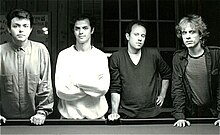The Bongos
| The Bongos | |
|---|---|

The Bongos (L-R): Richard Barone, James Mastro, Frank Giannini, Rob Norris at Compass Point, Bahamas. Photo by Emil Schult.
|
|
| Background information | |
| Origin | Hoboken, NJ, USA |
| Genres | Power pop, Art rock, Alternative Rock, Indie Rock |
| Years active | 1980–1987 |
| Labels | RCA Records, Sony BMG, Sony Legacy, Razor & Tie, Fetish Records, PVC Records, Stiff, Cooking Vinyl, Jem Records |
| Associated acts | Richard Barone, The Health & Happiness Show, East of Venus |
| Website | http://facebook.com/TheBongosOfficial |
| Past members |
Richard Barone Rob Norris Frank Giannini James Mastro |
The Bongos are a power pop band from Hoboken, New Jersey, primarily active in the 1980s, led by Richard Barone. With their unique musical style, they were major progenitors of the Hoboken pop scene, college radio favorites, and made the leap to national recognition with the advent of MTV. Their breakthrough song "Numbers With Wings" garnered the group a major cult following and was nominated at the first MTV Video Music Award presentations.
The Bongos grew out of a band called, "a", which had included the three original Bongos and Glenn Morrow, who later formed The Individuals and helped found Bar/None Records. "a" was the first band to play Maxwell's, a rock and roll club in Hoboken.
The group was led by Richard Barone on vocals and guitar and included Rob Norris, formerly of the Zantees on bass and Frank Giannini on drums. James Mastro, later of The Health & Happiness Show, joined the band as a guitarist after the release of their first LP. The group played extensively in Hoboken and New York City and toured the U.K. and Europe before touring in the U.S.
The Bongos emerged from Hoboken, and Manhattan's new wave and no wave venues such as Tier 3 and the Mudd Club, with a guitar-driven pop that belied a strong influence of the avant-garde. One of their early excursions as a trio was backing up violinist Helen Hooke of the legendary group The Deadly Nightshade (one of the first all-woman rock bands of the 1970s) at Gerde's Folk City. Hooke was instrumental in helping the band create their first demo recording. Soon, well-reviewed shows at Hurrah, Danceteria, and later The Ritz established them as particularly effective live performers. What set them apart from other such groups of the era were their sudden guitar outbursts or saxophone improvisations that echoed the work of Lou Reed, Ornette Coleman, or Captain Beefheart within the context of a pure, melodic pop song. In addition, unlike many of their peers, the group explored unabashedly sensuous dance rhythms that made their recordings dance-floor favorites.
...
Wikipedia
